What happens to your puppy in its first 14-16 weeks or life are critical to the personality it will develop as an adult. This is independent of where the puppy may have been born but is particularly important if they have had a less than ideal start in life e.g. as a puppy mill rescue dog. The way dogs are now viewed is considerably different to the way they were when I was growing up over 40 years ago. Dogs are no longer “Just a dog” There is now increasing understanding and treatment for dogs who are fearful, scared, aggressive (dog or human) or phobic. Because of this pet care professionals are now training in pet behavior so that they can appropriately attend to the needs of all pets that come into their care. No longer are animal and veterinary behaviorists the only pet care professionals looking at canine body language and considering how their actions impact on the pets in their care and how well animals are coping with the procedures that are required to achieve the service. Groomers, trainers, boarding kennel operators and pet walking and sitting professionals are assessing their processes, procedures and knowledge to provided an improved quality of service for all types of dogs.
When a dog first arrives at the groomers, boarding kennel or veterinary practice it is common practice for a client card containing dog details such as age, sex, breed and dietary requirements etc to be filled out. With the increasing knowledge about the effects of adequate or inadequate socialization and the increasing understanding of other factors in dogs it is should be common practice for pet owners to be asked the following questions as well:
- Where did your dog come from?
- What age was he when you got him?
- Does he react fearfully in any situations?
- How does he get on with other dogs and humans?
- Is he on any medications either long or short term, including medications for anxiety?
- (If at the groomers) Has he ever been clipped and HV dried before and how did he react?
- Has he been crate trained? (groomers, vets and kennels)
- How does he like machines such as the washing machine, vacuum cleaner?
- Is he frightened of thunderstorms?
- Has he ever been to dog obedience lessons/puppy preschool/private trainer/other trainer?
- If yes to the one above then – what method of training was used?
This is a large number of questions and you can see that dog groomers, veterinary technicians, kennel operators, even dog walkers and home sitters need to be highly skilled in canine behavior as the world we live in with our best friends is getting more and more complicated as we learn more about their individual behaviors and seek to make the best possible lives for them.
The big questions however are:
- Is there too many dogs being bred?
- Is the no kill policy of shelters allowing more damaged dogs to stay in our community?
- Does the way dogs live now (as against how they lied 40 years ago) leading to dogs who are less well socialized?
All of those issues are for another day and another blog.


Kareema
Healing Energy Animals
Kareema is the owners of Healing Energy Animals where devil dogs, horrible horses and crazy cats are turned into perfect pets using Relationship Animal Training and over 50 years of experience training a wide variety of animals.
Healing Energy Animals provides owners and pet professionals assistance with with common pet behavior training, feeding and grooming issues such as barking, escaping, scratching, aggression and fleas. Kareema consults and writes widely on a range of pet care issues for owners and also assists pet care professionals in setting up and growing their businesses by the provision of customer handling advice, sales and marketing strategies and up to date product information that allows for the differentiation of their pet care business from their competitors.
Healing Energy Animals is an Australian business but operates worldwide via the provision of virtual services.








